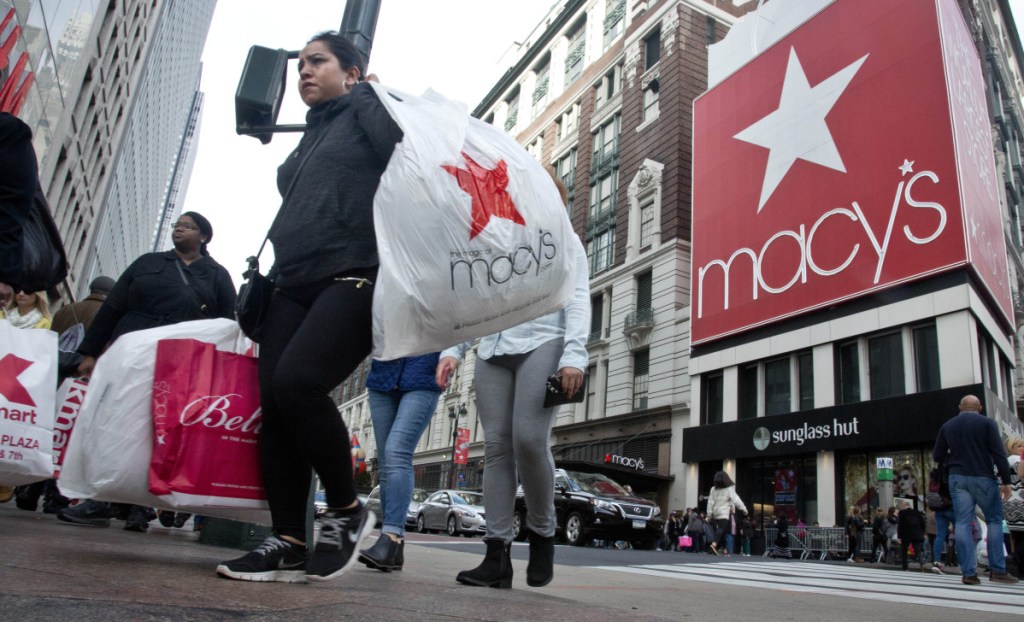NEW YORK — Many investors had expected department stores to enjoy robust sales over the holidays in light of an economy buoyed by low unemployment, higher wages, strong consumer confidence and cheap gas.
So when Macy’s and Kohl’s reported lackluster numbers Thursday, they were taken aback, sending retail stocks into a tailspin and calling into question whether such mall-based chains can compete in a changing landscape where shoppers are shifting more of their spending online.
Macy’s saw only a slight increase of 1.1 percent in sales during November-December at stores opened at least a year. And while sales were strong during Black Friday and Cyber Monday, the company said sales fell off noticeably until the week of Christmas.
Meanwhile, Kohl’s reported a small sales growth that showed a dramatic slowdown from a year ago. Comparable sales rose 1.2 percent, versus 6.9 percent in the previous year.
Shares of Macy’s plummeted more than 19 percent, on track for the worst day ever. Kohl’s stock was down nearly 7 percent. Even Target’s stock took a hit, falling nearly 4 percent despite showing strong holiday sales.
Earlier this week, J.C. Penney, one of the stragglers in the department store sector, reported a drop in comparable store sales of 3.5 percent for November and December. But because Macy’s is considered a barometer of spending, particularly for the middle class and for mall spending, investors may be looking for deeper meaning in its performance.
“Macy’s report spooked investors because investors expected it to be a great holiday season across the board,” said Neil Saunders, managing director at GlobalData Retail, a retail research firm. “Now they’re questioning how good the holiday season was. There is a lot of uncertainty out there.”
Adding to the uncertainty is that investors will not be getting December’s monthly retail sales data next week from the Commerce Department if the government shutdown is still in effect, as most observers expect.
Saunders said investors are also worried that a recovery among traditional stores like Macy’s is losing momentum, raising concerns that they might have to ramp up investments even more to increase sales.
Analysts say factors like a shift to online spending and consumer preferences for so-called experiences like spas and restaurants have hurt impulse spending that likely put a dent in December’s figures for Macy’s and Kohl’s.
Online sellers are relentlessly growing their share of retail sales. In November, e-commerce and catalog sales jumped 10.8 percent from a year earlier, according to Commerce Department data, more than double the overall sales increase of 4.2 percent. Department store sales slipped 0.2 percent during the same period.
And Marshal Cohen, chief industry adviser at NPD Group, estimates that as much as 40 percent of shoppers bought experiences as gifts this holiday season, up from 25 percent just a few years ago.
Macy’s on Thursday lowered its fiscal 2018 earnings outlook to $3.95 to $4 per share from its prior per-share earnings of $4.10 to $4.30 per share. That lowered numbers are well below analysts’ per-share projections of $4.23.
Copy the Story LinkSend questions/comments to the editors.



Success. Please wait for the page to reload. If the page does not reload within 5 seconds, please refresh the page.
Enter your email and password to access comments.
Hi, to comment on stories you must . This profile is in addition to your subscription and website login.
Already have a commenting profile? .
Invalid username/password.
Please check your email to confirm and complete your registration.
Only subscribers are eligible to post comments. Please subscribe or login first for digital access. Here’s why.
Use the form below to reset your password. When you've submitted your account email, we will send an email with a reset code.